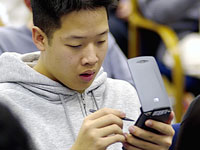The proliferation of handheld computing devices holds out the promise
for a new generation of computing applications that could enrich
experience of the world around us. The UCSD ActiveCampus project
is exploring the problem and opportunity of sustaining community
through mobile wireless technology. A major thrust is the development
of infrastructure for community-oriented ubiquitous computing and
development of applications and services for the large-university
environment. The two principal applications in operation are: ActiveCampus
Explorer, which uses students' locations to help engage them in
campus life; and ActiveClass, a client-server application for enhancing
participation in the classroom setting via small mobile wireless
devices.
As part of the ActiveCampus project, more than 700 wireless-equipped
HP Jornada handheld PocketPCs were distributed to undergraduate
students on the UCSD campus, including 285 entering freshmen of
the university's newest, residential Sixth College. The research
team also sponsored Sixth College's first Explorientation, a three-day
team challenge using the PDAs and ActiveCampus Explorer. ActiveCampus
now comprises eight integrated end-user services, and Communication
Department researchers are conducting ethnographic studies to understand
the impact on campus life.
"Undergraduate enrollment at UCSD will soar by 10,000 over the next decade,
and that growth can threaten the sense of community. We want
to see if technology can enhance our 'culture of learning' and
make the expanding campus seem somehow more intimate at the
same time."
- Bill Griswold, PI, ActiveCampus |
There is evidence
that a location-aware computing application such as ActiveCampus
Explorer, with its many services has the potential to create impromptu
opportunities for its users in the campus environment. As part of
Explorer, students are able to send each other messages and post
Digital Graffiti, signed or unsigned - to be read by other users
of the service when they visit a particular area.
One surprising finding: UCSD students are more likely to message
each other when they are closer than average - indicating that location
may matter in context-aware handheld computing. Researchers report
that one possible reason for this is that the sender of the message
perceived the short distance, providing an impulse to communicate
(and perhaps meet).
The ActiveClass application allows students to use their PDAs to
ask questions in class anonymously, answer polls, and give the professor
feedback on the class. Every student and the professor see these
lists of questions, poll results, etc. Students can also vote on
pending questions, thereby raising their ranking - and encouraging
the professor to give those questions precedence. The modality is
a silent, aggregated broadcast conversation.
Contact: Bill Griswold
(858) 534-6898
wgg@cs.ucsd.edu
http://activecampus.ucsd.edu

